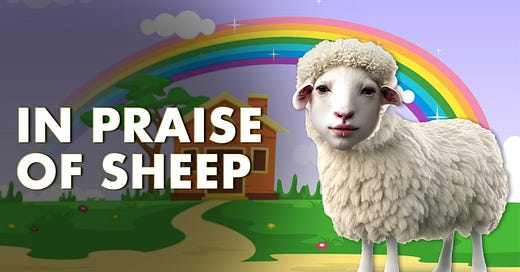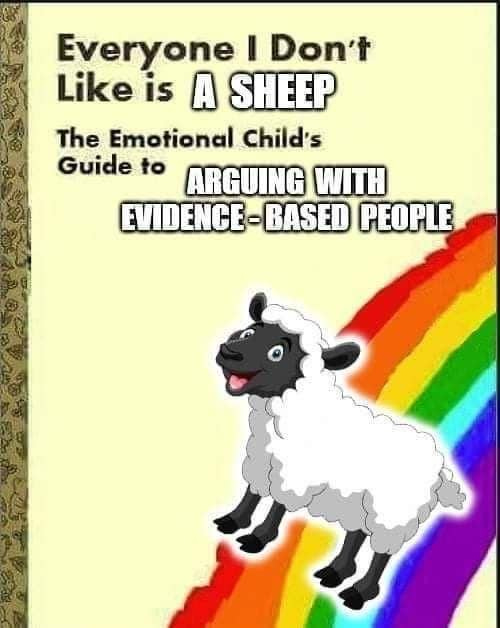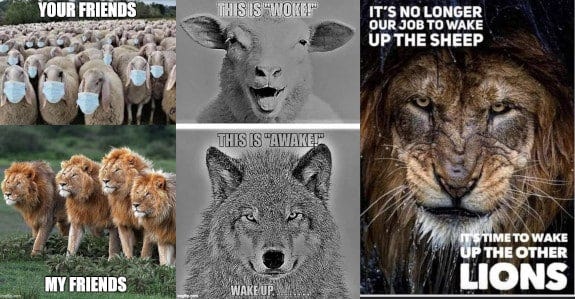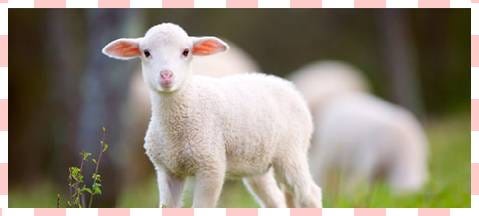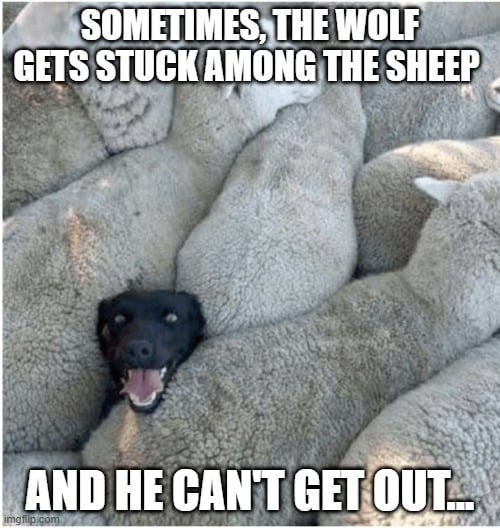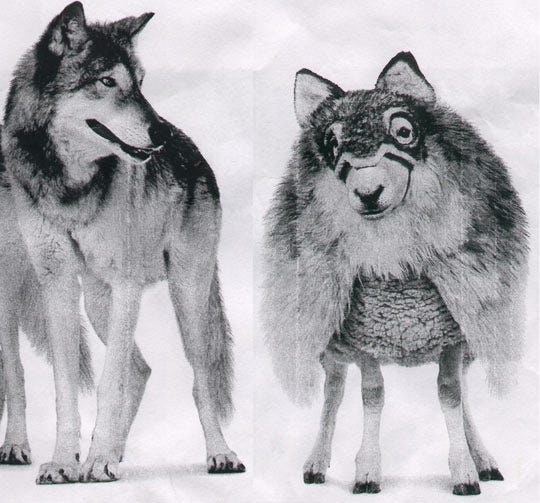by James Corbett
corbettreport.com
June 8, 2025
If I were to write "If there is hope, it lies in the proles," the book readers among you would no doubt nod your heads, recognizing the Orwell reference.
Yes, you would say to yourself, scratching your chin in contemplation. It's true. The Party can't be overthrown from within. It's only the great mass of humanity who will be able to accomplish that. I mean, just see what happens to Winston Smith at the end. Even he gets subsumed by Big Brother.
But if I were to write "If there is hope, it lies in the sheeple," your reaction would no doubt be very different, regardless of how well-read you are.
What? The sheeple? They're all useless idiots! They're leading us all to the slaughter! I hate them and I laugh when they die suddenly after taking their 3rd jab!
But I am going to write it nonetheless: "If there is hope, it lies in the sheeple."
Now, if you'll join me, let's explore that concept. Once we get past the knee-jerk reaction that most of us will have to that statement, I think you'll agree that there is a profound truth in these words.
WAKE UP, SHEEPLE!!!
Picture this scene: a group of angry protesters mill about in a public square. They carry signs warning about chemtrails. They want people to look up and take note of the criss-crossing lines in the sky. From the crowd, a man emerges with a megaphone. He gathers his breath, preparing to scream something into the device.
Now, whether you're a hard-nosed conspiracy realist picturing a courageous truth-teller screaming into that megaphone or a dedicated establishment-supporter picturing some wild-eyed conspiracy nutter accosting people with that megaphone, you know exactly what phrase is being screamed into the device:
Ah yes, "Wake up, sheeple!" The rallying cry of the Gutenberg 2.0 revolution.
As a portmanteau referring to the sheep-like docility of the masses, the word "sheeple" is itself a fascinating study in how language and intention intersect (or fail to intersect) with reality.
Is "sheeple" being used to simply describe those who are sleeping on some important truth?
Or is it being used to mock the masses and their perceived tendency to blindly obey authority?
Is it being used to deride the type of people who use the phrase "Wake up, sheeple!" unironically?
Or is it being used as a way to ridicule conspiracy theorists and conspiracy theories generally?
Perhaps it's being used as part of an ironic commentary on the masses' tendency to overexaggerate the uniqueness of their supposed nonconformity.
Or has it become so clichéd that the very phrase is now seen as nothing more than the set up to an absurdist joke?
The answer to all of these questions, of course, is "yes." Like so many of the most intriguing phrases of our post-enlightened, postmodern, post-truth, post-ironic age, "Wake up, sheeple!" has now entered that weird liminal space where it can take on any or all of these meanings depending on the perspective of the listener.
So, what should we make of this clarion call to rouse from our slumber?
What People THINK It Means
Let's start by taking the phrase at face value.
The "sheeple" are being asked to "wake up." But what does this mean?
Presumably, when the phrase is being deployed by an earnest truth-seeker, it's a plea for the masses to stop ignoring some important issue. They need to "wake up" and realize they've been lied to about x, where "x" refers to the reality of false flag terror or the encroaching tyranny of the biosecurity state or the dangers of the digital ID control grid or the fact that Tommy Wiseau is in fact D. B. Cooper, or some other Very Important Truth.
But let's imagine a scenario in which the "sheeple" actually heed the rabble-rouser's advice and "wake up" to the reality of the problem in question. What then?
The real implication of the phrase, it seems, is that, once "awakened" on the issue of importance, the sheeple will stop being sheeple and become something else entirely.
And what, exactly, should they become? Well, if internet memes are anything to go by, they should become lions or wolves or some other fearsome, predatory animal.
At first glance, it isn't hard to see why the memelords (and, no doubt, others in the conspiracy realist community) are attracted to this metaphor. Sheep are by nature trusting, meek, passive and blindly obedient. Lions and wolves are the antithesis of sheep. They are vicious, intimidating and relentless in their pursuit of their objectives.
If we want to "wake up the sheeple," then by this logic it follows that we want them to "wake up" and realize they are powerful attack animals—animals that can tear their enemies (the globalist elitists or whoever else stands in their way) to shreds. Right?
This is, after all, the way Orwell framed it in Nineteen Eighty-Four when Winston Smith ponders the fact that the hope for the future of the dystopian world of 1984 lies in the "proles" (the 1984 equivalent of "sheeple").
If there was hope, it must lie in the proles, because only there, in those swarming disregarded masses, eighty-five per cent of the population of Oceania, could the force to destroy the Party ever be generated. The Party could not be overthrown from within. Its enemies, if it had any enemies, had no way of coming together or even of identifying one another. Even if the legendary Brotherhood existed, as just possibly it might, it was inconceivable that its members could ever assemble in larger numbers than twos and threes. Rebellion meant a look in the eyes, an inflection of the voice; at the most, an occasional whispered word. But the proles, if only they could somehow become conscious of their own strength, would have no need to conspire. They needed only to rise up and shake themselves like a horse shaking off flies. If they chose they could blow the Party to pieces tomorrow morning. Surely sooner or later it must occur to them to do it. And yet—!
Yes, no doubt every truth-seeker has imagined that moment when the sheeple "wake up" and then, more importantly, rise up, becoming not the prey of the powers-that-shouldn't-be but the predators of that class.
. . . But let's stop to think about that fantasy scenario in greater detail. If the masses of people—not just a small pack of independent, critical thinkers, but the vast majority—suddenly "woke up" and became ferocious lions and marauding wolves and started attacking those who stood in their way and spilling the blood of all who resisted, at what point would this revolution of awakened lions and wolves simply become the new psychopathic ruling class?
Do we really want the masses to become ruthless killers in the pursuit of truth? Or is there a different way to imagine this revolution of the sheeple?
What's So Bad About Sheep?
Upon further contemplation, it becomes obvious that the entire premise of the "Wake up, sheeple" meme rests on the assumption that sheep are loathsome and pathetic creatures.
After all, sheep are blindly trusting. They are docile. They are obedient. They follow the herd. As a metaphor for the blindly trusting, docile, obedient masses, we can once again look to Orwell, whose Animal Farm tyranny was enabled by the mindless sheep who could be trained to bleat "four legs good, two legs bad" or "four legs good, two legs better" (or presumably anything else that their leader wanted them to bleat) on command.
But what if these sheeply "vices" were not in fact vices, but virtues? What if the peaceable nature of the sheep were not seen as a weakness, but a strength?
This is a perspective I invite my readers to consider in "A Letter to the Future," one of the twenty essays in my brand-new book, REPORTAGE: Essays on the New World Order (available now wherever books are sold . . . or ordered by ISBN number!).
It is a term of derision, of course. “Sheeple.” But I like to think that it doesn’t just speak to our stupidity. It also speaks to a naivety, an innocence. We are trusting and gentle creatures by nature. Peaceable. Cooperative. That is nothing to be scorned. In fact, if it weren't for the predators in our midst, this failing would be counted as a virtue.
Yes, masses of peaceable people who are content to live their lives and graze in the sunshine and enjoy the company of their friends is indeed nothing to be scorned. What kind of person fantasizes about being a blood-drinking predator, anyway?
But even if this narrative reframing is unconvincing to the would-be Rambos in the crowd who do prefer to think of themselves as apex predators rising up against the globalists, let's at least think critically about what it is we're trying to accomplish with our "Wake up, sheeple!" uprising.
If we're serious about not just getting rid of the mis-rulers of humanity but actually overthrowing their system of control, what would that actually involve? And what kinds of tactics could be employed that wouldn't just make us into the new mis-rulers of humanity after the uprising takes place?
Perhaps we are only hindered by our presuppositions about nature itself and about the true meaning of power.
Perhaps we could find ways to become wise as serpents while remaining harmless as doves.
In other words, perhaps reductive and derogatory language about "sheeple," far from explaining our world and the nature of our predicament, actually stops us from seeing the many, many possibilities for creative revolution that are already at our fingertips. (Or is that our hooftips?)
Whatever the case, I hope you might at the very least join me in seriously contemplating whether it might be true that:
"If there is hope, it lies in the sheeple."
Like this type of essay? Then you’ll love The Corbett Report Subscriber newsletter, which contains my weekly editorial as well as recommended reading, viewing and listening. If you’re a Corbett Report member, you can sign in to corbettreport.com and read the newsletter today.
Not a member yet? Sign up today to access the newsletter and support this work.
Are you already a member and don’t know how to sign in to the website? Contact me HERE and I’ll be happy to help you get logged in!

